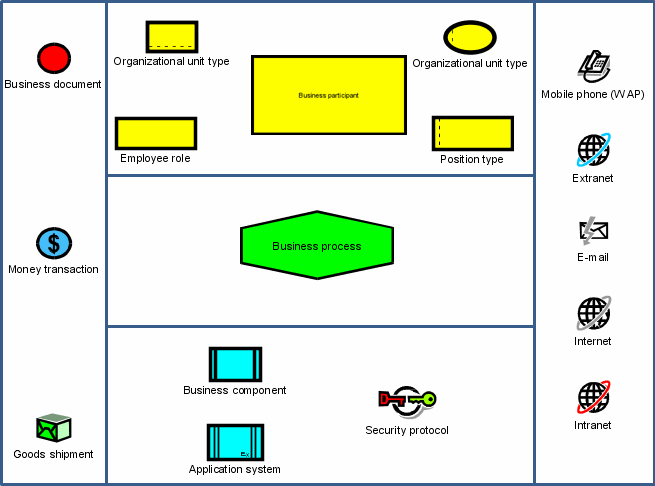The model and its objects
The economic agents considered in the model are placed in the header and identified as business participants. They originate from the organization view and can be assigned organizational charts that may serve to describe the company structure or the relationships between the objects of the individual columns in more detail.
An economic agent's individual processes participating in the overall process and the interfaces between them are the central and structurally relevant objects of the model. An individual process is a business process that plays an important role in inter-company cooperation. A more precise representation and analysis of such an individual process can be obtained by assigning a process model. All processes running in a company are modeled in the row below the business participant, but in the same column. Inter-company coordination also requires precise analysis of application systems and hardware in use by the various economic agents in support of their individual processes (e.g., ERP systems). These elements are represented by Business components. To coordinate the various components, responsibilities for the systems must be specified exactly. For this purpose, Organizational unit type objects are available. Even the roles of the employees involved in the process can be defined. These are referred to in the model as Employee role. The integration of interfaces is a particular requirement of e-business modeling. In this context the column borders are of crucial importance since they symbolize the interfaces between the process participants. They can be viewed from several perspectives.
One focus can be the transfer of process-specific information. That is the purpose of Business documents, which can assume the form of XML or HTML documents. The business document can be assigned a model of the data view, for example, a document type definition. Alternatively, the flow of money or goods can be displayed using the Money transaction or Goods shipment objects.
Another important aspect: data security must be ensured, especially the security of electronic payments sent via Internet. Different encoding techniques can be used for this purpose, e.g., SET (Secure Electronic Transaction) or SSL (Secure Socket Layer). The security aspect can be taken account of by using the Security protocol object. It is also possible to define persons responsible for the security of transactions, which can be represented by an Organizational unit type. Furthermore, the focus may be put on analyzing a more technical aspect, namely the technical design of the data transfer at the interfaces. For this purpose, the model uses various information carriers. Individual processes can be linked via intranet, extranet, or Internet. Data transfer can take place by e-mail. The mobile phone has also gained ground as a transmission medium.

